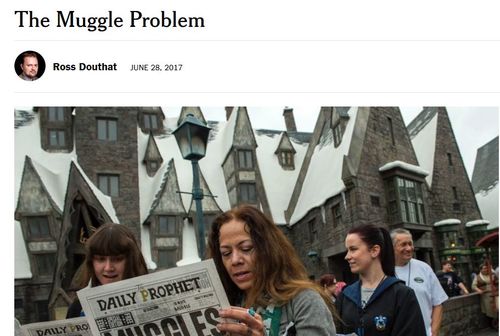


By Steve Sailer
06/29/2017
In the New York Times, Ross Douthat takes a crack at the same Spotted Toad blog post about the roots of Harry Potter worship that I wrote up in my Taki’s column “Hogwash 101” back in April.
As you’ve no doubt noticed, it has become common to analyze current politics through the lens of the Harry Potter series. But that’s quite recent. Back in 2008, I made what I thought was an obvious reference to J.K. Rowling’s sixth novel Harry Potter and the Half-Blood Prince in naming my reader’s guide to Barack Obama’s memoir America’s Half-Blood Prince: Barack Obama’s ‘Story of Race and Inheritance,’ but nobody at the time seemed to get it.
Now, of course, Potter references in political opinionizing are omnipresent.
Blogger Spotted Toad noted:
‘Harry Potter’ is a funny fantasy for liberals to cohere around. Going off to a centuries-old boarding school where your mum and dad were Head Boy and Head Girl, where tolerance and broadmindedness consists of admitting that lower-class Muggles can occasionally have the same genetically-mediated gifts as the gentry …
Ross writes:
By Ross Douthat JUNE 28, 2017
… Because if you take the Potterverse seriously as an allegory for ours, the most noteworthy divide isn’t between the good multicultural wizards and the bad racist ones. It’s between all the wizards, good and bad, and everybody else — the Muggles.
Muggles are the boring masses of normies born without the genetic capability to do magic. In Harry Potter’s world, magical ability is a recessive genetic trait that is inherited according to rules like those that govern the inheritance of blue eyes.
Hogwarts professor Severus Snape (Alan Rickman in the movies), for example, calls himself the The Half-Blood Prince because his father was a Muggle. Fortunately, Snape didn’t inherit his father’s genetic disability.
Muggles are too stupid to notice that wizards actually rule the world, and the wizards prudently keep them in ignorance.
… The proper treatment of Muggles, meanwhile, is the great controversy within the wizarding world, where the good guys want them protected, left alone and sometimes studied, while the bad guys want to see them subjugated or enslaved (and all the Muggle-born “mudbloods” purged from the wizarding ranks).
All of this plays as an allegory for racism, up to a point … but only up to a point, because what’s notable is that nobody actually wants to see the mass of Muggles (as opposed to their occasional wizardish offspring) integrated into the wizarding society. Indeed, according to the rules of Rowling’s universe, that seems to be impossible. You’re either born with magic or you aren’t, and if you aren’t there’s really not any obvious place for you in Hogwarts or any other wizarding establishment.
So even from the perspective of the enlightened, progressive wizarding faction, then, Muggles are basically just a vast surplus population that occasionally produces the new blood that wizarding needs to avoid becoming just a society of snobbish old-money inbred Draco Malfoys. And if that were to change, if any old Muggle could suddenly be trained in magic, the whole thrill of Harry Potter’s acceptance at Hogwarts would lose its narrative frisson, its admission-to-the-inner-circle thrill.
Which makes the thrill of becoming a magical initiate in the Potterverse remarkably similar to the thrill of being chosen by the modern meritocracy, plucked from the ordinary ranks of life and ushered into gothic halls and exclusive classrooms, where you will be sorted — though not by a magic hat, admittedly — according to your talents and your just deserts.
I am stealing this magic-and-meritocracy parallel from the pseudonymous blogger Spotted Toad, who wrote a fine post discussing how much the Potter novels and movies trade upon the powerful loyalty that their readers feel, or feel that they should feel, toward their teachers and their schools. But not just any school — not some suburban John Hughes-style high school or generic Podunk U. No, it’s loyalty to a selective school, with an antique pedigree but a modern claim to excellence, an exclusive admissions process but a pleasingly multicultural student body. A school where everybody knows that they belong, because they can do the necessary magic and ordinary Muggles can’t.
Thus the Potterverse, as Toad writes, is about “the legitimacy of authority that comes from schools” — Ivy League schools, elite schools, U.S. News & World Report top 100 schools. And because “contemporary liberalism is the ideology of imperial academia, funneled through media and nonprofits and governmental agencies but responsible ultimately only to itself,” a story about a wizarding academy is the perfect fantasy story for the liberal meritocracy to tell about itself.
Something that is often forgotten about J.K. Rowling’s books/movies is that while they started out being almost equally popular among girls and boys (the authoress chose old-fashioned initials to hide her sex from little girl-hating he-men), by the time the eighth and (sort of) final movie in the series finally came out, their appeal was almost wholly to girls, just as J.R.R. Tolkien’s fans are overwhelmingly male.
Why? Mostly, I think, because J.K. is a girl and J.R.R. was a boy. In the very long run, sex will tell.